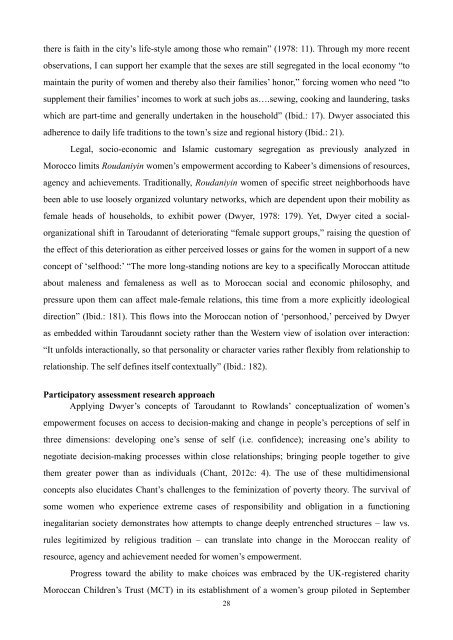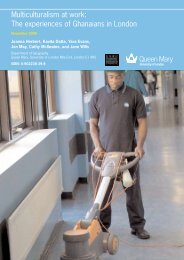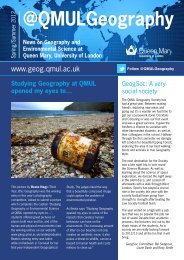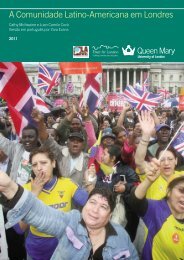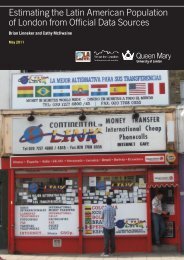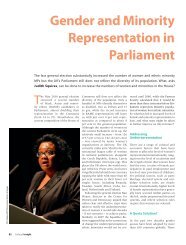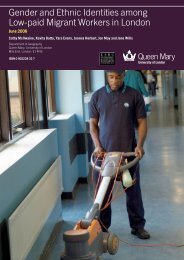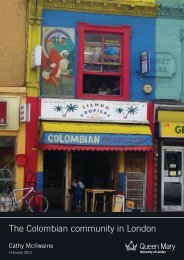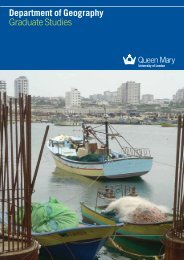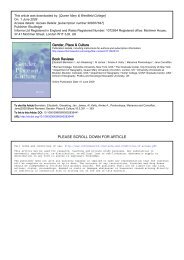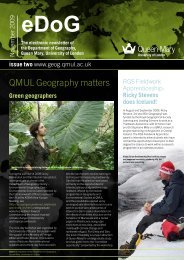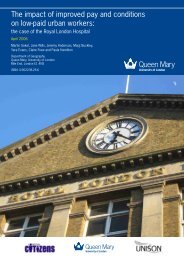Women's Empowerment and the Feminization of Poverty among
Women's Empowerment and the Feminization of Poverty among
Women's Empowerment and the Feminization of Poverty among
- No tags were found...
Create successful ePaper yourself
Turn your PDF publications into a flip-book with our unique Google optimized e-Paper software.
<strong>the</strong>re is faith in <strong>the</strong> city’s life-style <strong>among</strong> those who remain” (1978: 11). Through my more recentobservations, I can support her example that <strong>the</strong> sexes are still segregated in <strong>the</strong> local economy “tomaintain <strong>the</strong> purity <strong>of</strong> women <strong>and</strong> <strong>the</strong>reby also <strong>the</strong>ir families’ honor,” forcing women who need “tosupplement <strong>the</strong>ir families’ incomes to work at such jobs as….sewing, cooking <strong>and</strong> laundering, taskswhich are part-time <strong>and</strong> generally undertaken in <strong>the</strong> household” (Ibid.: 17). Dwyer associated thisadherence to daily life traditions to <strong>the</strong> town’s size <strong>and</strong> regional history (Ibid.: 21).Legal, socio-economic <strong>and</strong> Islamic customary segregation as previously analyzed inMorocco limits Roudaniyin women’s empowerment according to Kabeer’s dimensions <strong>of</strong> resources,agency <strong>and</strong> achievements. Traditionally, Roudaniyin women <strong>of</strong> specific street neighborhoods havebeen able to use loosely organized voluntary networks, which are dependent upon <strong>the</strong>ir mobility asfemale heads <strong>of</strong> households, to exhibit power (Dwyer, 1978: 179). Yet, Dwyer cited a socialorganizationalshift in Taroudannt <strong>of</strong> deteriorating “female support groups,” raising <strong>the</strong> question <strong>of</strong><strong>the</strong> effect <strong>of</strong> this deterioration as ei<strong>the</strong>r perceived losses or gains for <strong>the</strong> women in support <strong>of</strong> a newconcept <strong>of</strong> ‘selfhood:’ “The more long-st<strong>and</strong>ing notions are key to a specifically Moroccan attitudeabout maleness <strong>and</strong> femaleness as well as to Moroccan social <strong>and</strong> economic philosophy, <strong>and</strong>pressure upon <strong>the</strong>m can affect male-female relations, this time from a more explicitly ideologicaldirection” (Ibid.: 181). This flows into <strong>the</strong> Moroccan notion <strong>of</strong> ‘personhood,’ perceived by Dwyeras embedded within Taroudannt society ra<strong>the</strong>r than <strong>the</strong> Western view <strong>of</strong> isolation over interaction:“It unfolds interactionally, so that personality or character varies ra<strong>the</strong>r flexibly from relationship torelationship. The self defines itself contextually” (Ibid.: 182).Participatory assessment research approachApplying Dwyer’s concepts <strong>of</strong> Taroudannt to Rowl<strong>and</strong>s’ conceptualization <strong>of</strong> women’sempowerment focuses on access to decision-making <strong>and</strong> change in people’s perceptions <strong>of</strong> self inthree dimensions: developing one’s sense <strong>of</strong> self (i.e. confidence); increasing one’s ability tonegotiate decision-making processes within close relationships; bringing people toge<strong>the</strong>r to give<strong>the</strong>m greater power than as individuals (Chant, 2012c: 4). The use <strong>of</strong> <strong>the</strong>se multidimensionalconcepts also elucidates Chant’s challenges to <strong>the</strong> feminization <strong>of</strong> poverty <strong>the</strong>ory. The survival <strong>of</strong>some women who experience extreme cases <strong>of</strong> responsibility <strong>and</strong> obligation in a functioninginegalitarian society demonstrates how attempts to change deeply entrenched structures – law vs.rules legitimized by religious tradition – can translate into change in <strong>the</strong> Moroccan reality <strong>of</strong>resource, agency <strong>and</strong> achievement needed for women’s empowerment.Progress toward <strong>the</strong> ability to make choices was embraced by <strong>the</strong> UK-registered charityMoroccan Children’s Trust (MCT) in its establishment <strong>of</strong> a women’s group piloted in September28


